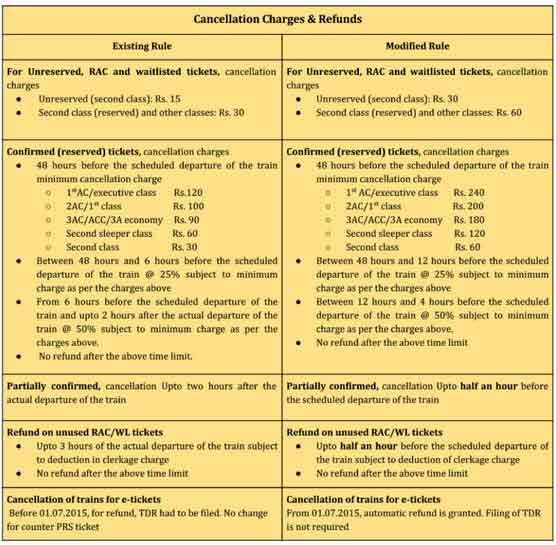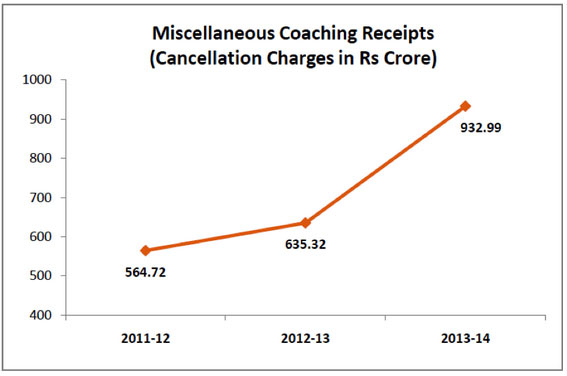
Indian Railways is the backbone of the long distance public transport system in the country.
In 2013-14, a total of 840 crore passengers travelled via the Indian Railways. While crores of people depend on the railways for their movement, many complaints have been received in the past about how the tatkal ticket booking system has been misused.
Even the Comptroller & Auditor General (CAG) has also highlighted many irregularities in the passenger reservation system.
In a latest move to curb such misuse, the Indian Railways has come up with a set of new Cancellation/Refund rules along with introducing a new process for charting.
The New Cancellation & Refund Rules
The Ministry of Railways said that the new rules are to help genuine passengers and to plug the scope of misuse of ticketing activity by unscrupulous elements.
The new rules have been notified and will come into effect from 12th November, 2015
According to the official statement, the objective of the changes is
- To plug the scope of misuse.
- Facilitate passengers with mobile ticketing/proposed paperless ticketing etc.
- Discourage touts/agents on black marketing of tickets.
The first major change is to enable the UTS (Unreserved Ticketing System) counters in some places to process cancellation requests and issue refunds beyond the working hours of the Passenger Reservation System (PRS) counters.
The UTS counters will double up as the PRS counters and process refunds in case of cancellations. Automatic refund (for tickets booked online) in case of cancellation of trains is also enabled from July this year. Before this, a ticket deposit receipt (TDR) had to be filed for the refund.
Some of the important changes are mentioned in the table below

In case of cancellation of unused tatkal tickets, no refund will be granted except in certain cases like when there is a partial confirmation (some passengers have confirmed reservation and some don't on the same ticket), late running of trains etc.
These rules might help the railways optimally use the seats in various classes since passengers might cancel tickets 4 hours prior to the departure to get the refund.
The modified refund time limit of up to half an hour before the scheduled departure of the train for RAC and partially confirmed tickets will also help the passengers a great deal.
The higher cancellation charges might discourage agents/touts who reserve tickets using fictitious names and later sell them at higher prices.
The rules might also help the railways increase the revenue earned through cancellation charges. Cancellation charges are accounted under the head 'Miscellaneous Coaching Receipts'.
The Miscellaneous coaching receipts have been growing continuously. They have grown from 564.72 crore in 2011-12 to 932.99 crore in 2013-14.

New Rules for Booking
Along with the new cancellation & refund rules, a new set of booking rules will also come into effect from the 12th November, 2015.
These rules follow the changes made in refund rules that allow cancellation (for refund) of confirmed tickets only up to 4 hours prior to the departure of the train.
Some of the important features of the new booking system are
First Reservation Chart to be made 4 hours before Departure: From now on, reservation charts will be made at least 4 hours before the scheduled departure of the train.
In case the same are not made by the charting section, the system will automatically finalize them 4 hours before the scheduled departure of train(to be effective from 18th November 2015).
This will facilitate passengers to know the status of the ticket to plan their journey well in time.
Booking Counters will again open after the first reservation chart: Immediately after preparation of first reservation charts, the reservation will again become open at the PRS counters as well as on internet (e-ticket) and the passengers can
- Book the available accommodation in the train in case there is no RAC/waitlist for that leg.
- In case of passengers holding RAC/waiting list ticket, the passengers will be given facility to cancel the ticket up to 30 minutes before the scheduled departure of train.
This will facilitate the passengers, particularly partially confirmed passengers, to decide either to undertake the journey or to cancel their ticket.
A second (and final) chart of reservations will be made available before departure of train and handed over to onboard ticket checking staff.
This exercise is expected to ensure optimum utilization of train accommodation as well as enhanced earnings.
(Rakesh has been working on issues related to Right to Information (RTI) for a decade. He is a Data/Information enthusiast & passionate about Governance/Policy issues)





















